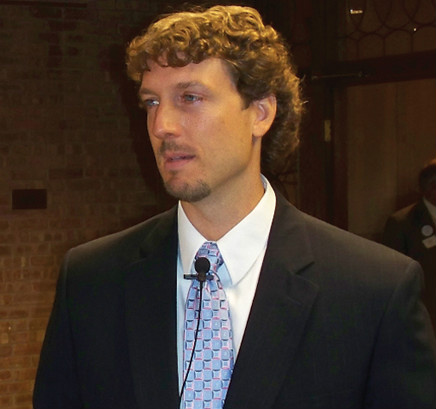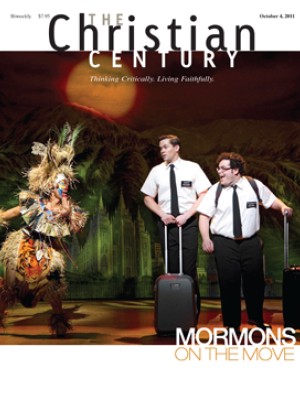Pastor as witness: Ministry in the 21st century

What is pastoral ministry like these days, and how is it being shaped in new ways? The Century talked to pastors about the challenges and surprises of their early years in ministry. This interview is the third in a series. Kevin J. Long is a graduate of Pittsburgh Theological Seminary. He serves as associate pastor at Orchard Park Presbyterian Church in suburban Indianapolis, where his responsibilities include preaching, adult discipleship and pastoral care.
What excites you most about ministry these days?
The eagerness with which so many people are listening to the gospel. Our world is full of so many voices offering happiness, success, significance, even salvation. But there is nothing quite like the gospel, and when it is faithfully proclaimed, by the power of the Holy Spirit people respond. I think people are becoming more aware of the vacuity of our cultural idols and are searching for an alternative. And though it doesn't happen every day, it is quite thrilling to see someone begin to grasp the good news of Jesus Christ.
Read our latest issue or browse back issues.
Could you describe one such experience?
A woman at our church comes from a religious background that was pretty fundamentalist and judgmental—God was always angry at her. So guilt and fear have dogged her all her life. After hearing a few sermons on God's grace, love and forgiveness, she began stopping by my office to talk. It was clear that she was desperate to believe what she was hearing, but it was hard to reconcile it with what she had always thought. Over time, however, I began to see a change come over her, a light begin to shine in her. Sometimes I would even start saying something and she would finish my sentence with delight. She was beginning to understand the power, the depth and the freedom of the gospel.
Then a terrible tragedy happened in her family, leading her to wrestle with the grace of God and come to stand on her own spiritual feet. It's been amazing to witness what God has done in her life as she has walked through these hard times. She's a different person than she was when I met her, and it's a privilege to be a part of something like that.
What's been the hardest part of parish ministry?
My church community is quite affluent—wealth and success are powerful idols here. So it's difficult to get people to make the church a priority in their lives; everyone is so overscheduled. But the most difficult thing is finding a way to bring the truth of the gospel into people's lives in such a way that it breaks through their cultural armor without resorting to clichés, advice or finger-shaking.
What's been most surprising?
The fact that I can do this. I'm a pastor's kid, and I spent most of my life insisting that I would never go into ministry. I never thought I had the right gifts for it. I'm a shy, quiet introvert; in school I always avoided taking classes requiring speeches. Given my personality, seminary sounded like a death sentence.
 But I accepted God's call to become a pastor, trusting that God would go with me and equip me to do what God wanted me to do. Yet there is always that bit of fear that whispers, "What if I'm really on my own here? What if I shouldn't be in ministry after all?" But God has been unbelievably faithful. I am still shocked that I not only keep coming up with new sermons but that I also deliver them in front of hundreds of people. All I can say is that the Holy Spirit comes through.
But I accepted God's call to become a pastor, trusting that God would go with me and equip me to do what God wanted me to do. Yet there is always that bit of fear that whispers, "What if I'm really on my own here? What if I shouldn't be in ministry after all?" But God has been unbelievably faithful. I am still shocked that I not only keep coming up with new sermons but that I also deliver them in front of hundreds of people. All I can say is that the Holy Spirit comes through.
What was your call experience like? Did it include reevaluating your sense of a lack of gifts for ministry? Or did you move forward purely on trust?
I had a hard time figuring out what to do with myself in my mid-twenties. I was back in Pittsburgh one weekend when someone told me that Ken Bailey, an old family friend, was preaching across town that Sunday. I hadn't seen Ken in a while, so I went.
In the middle of that service—during the song "Here I Am, Lord"—I had sort of a lightning-bolt moment. I felt God calling me into ministry, loud and clear. I just stood there with tears streaming down my face, because ministry was the last thing I wanted to do. So I had one of those comical arguments with God, in which I insisted that I would never go to seminary as a single guy. A few months later, I met the woman who I would marry in two years. I began to pray steadily for God's will in my life. Like a beach ball held under water, the call to ministry kept bouncing right back up in front of me. After months of praying for anything but seminary, I finally said, "Fine, I'll go to seminary. Just as long as I don't have to preach."
I was terrified at the idea of leading worship and speaking in front of so many people. I had as models for ministry my dad and Tom Tewell, the pastor at the Fifth Avenue Presbyterian Church in New York. Both were extroverts with great charisma and people skills. If this is what it takes to be a minister, I figured, I'm not it. But I took a leap of faith. In seminary, God placed me at the feet of just the right people. I studied with Craig Barnes and Andrew Purves, who have personalities more like mine; my field education supervisor did as well. They showed me that someone like me could not only survive in ministry but even thrive.
When I was in seminary, Barnes was my pastor as well as my professor. He gave me a wonderful vision of what it means to be a pastor. My true homiletics class was sitting in the pews Sunday after Sunday at Shadyside Presbyterian. I spent my last year in Pittsburgh analyzing what he was doing, and I began to think to myself, "Hey, I think I can do that." Barnes also helped me to understand that one of my primary roles as pastor is that of witness: witnessing the salvation that Christ is working in the lives of my congregation and helping them develop the lenses to see it as well.
As for Purves, he pressed us hard about keeping Jesus Christ at the center of everything we do—because it's Christ's ministry, not ours. Purves reminded us again and again that ministry is always a theological act, and he told us he'd come find us if we succumbed to "christological timidity."
Say more about what christological timidity is.
It's when I start to think that somehow Jesus is superfluous, a helpful tool in ministry but not really a necessity. It is preaching that fails to point to Jesus Christ and what he is doing in the world—or worse, that downplays his unique role in salvation. It is thinking that is anthropologically oriented rather than christologically oriented.
I think christological timidity arises from a failure to fully believe that Christ is the Savior and we are not. It is so easy for pastors to develop a messiah complex, to think that it is up to us to heal the sick and raise the dead. But our job is to pay attention to what Purves would call the "mischief" that the living Christ is up to in the lives of our people—and to point to it.
At a recent conference, I went to a breakout session about what it means for churches to be missional. It wasn't until more than halfway through the hourlong conversation that anyone mentioned Jesus—at which point the conversation improved dramatically. But why did it take so long?
Along with Barnes and Purves, who else has shaped your understanding of ministry?
William Willimon, especially in regard to preaching. I appreciate his critique of the American church, and he's taught me to listen to public rhetoric with a different ear. He's also helped me go through ministry with a sense of anticipation about what unpredictable thing Jesus might do next. Willimon emphasizes the role of the Holy Spirit—not only in preaching the gospel but in hearing it. This has helped free me from worrying about the results of my preaching.
How have pastors and others with more experience been helpful? Or unhelpful?
I had the great privilege of coming into a church whose two other pastors have decades of experience behind them. It's been helpful to be able to walk down the hall and ask one of them what they think or how they would handle a particular dilemma. There is also a retired pastor in our congregation who has been an enormous blessing, letting me run ideas off him and pick his brain.
As for unhelpful, all pastors fall into bad habits of one sort or another. When you work with other pastors, sometimes it's easy to pick up those bad habits yourself. I think that the longer we are out of seminary, the easier it is to forget the theological grounding for ministry and simply do what is convenient or expedient rather than what is most faithful.
Who else do you turn to for collegiality and inspiration?
I meet twice a year with my PCUSA's Company of New Pastors group to discuss ministry and theology. And for the past two years I have been able to attend the Festival of Homiletics, a wonderful opportunity to relax among colleagues for a week and listen to other preachers and teachers of homiletics.
I also listen to a lot of sermons and lectures online. My regulars are Barnes, Willimon and Jim Somerville (a Baptist preacher in Virginia). This gives me a chance to hear the word proclaimed, which is rare for most preachers. It also inspires me to take risks and try new things in the pulpit—as well as to expand my understanding of the gospel.
On the basis of your experience so far, how would you want to change your seminary curriculum?
I would certainly like to have had more training in public speaking. I had almost no experience in that before I came to seminary.
Would general public speaking training be helpful, or is preaching too particular a practice?
At least some basic training would be very helpful. Too many people don't understand that speaking publicly is not the same as talking to an individual. It's helpful to learn about pacing, pausing and finishing sentences without dropping your voice. I was fortunate to have a woman in my field education congregation who was something of an expert on this stuff. She would often gently remind me of these things.
But I do think that preaching is unique. It's not simply a matter of putting on a good vocal show—that can come across as more of a performance than a proclamation of the word.
More generally, I also think that there needs to be a change in the way preaching is taught. I'm not sure the standard method of having seminarians read books on preaching and then practice writing an approved type of sermon is that effective anymore. I think preaching, like ministry, is probably best learned from a mentor. Find a master preacher whose style connects with you and really study what that person does. I'm not sure how this would work at a seminary, but I think some kind of change is needed.
What does your denominational affiliation mean to you and your parishioners?
For many people in my congregation, it really doesn't mean much at all. Quite a few of our members come from other denominations. For them, the quality of the preaching, ministry and fellowship are more important than the label on the front of the church. But personally, I love being Presbyterian. True, it's all I've ever known, but I also love our tradition and theology and connectionalism. Being Presbyterian helps remind me that we didn't just make this stuff up, that our faith is an inheritance passed down through the centuries. I have often wondered what tradition I would choose if I had to be something other than Presbyterian. I still don't know the answer.
What's your sermon-prep process? What resources do you find helpful?
I usually start on Monday by spending time pondering what the text might be trying to say to my people and searching for a hook, an axis on which the sermon will turn. For the next few days, I spend time in prayer and look through commentaries and other books. And I've learned that it is important for me also to spend time staring out the window, letting my imagination run as I try to dive beneath the text and consider how it might connect to the subtexts of my people's lives. Throughout the week, I take lots of notes—ideas from books, thoughts that come to me as I go.
On Thursday I try to envision a path for the sermon to take, weaving my thoughts into a coherent unit. It's almost like a play that has been broken up into pieces, and I have to figure out the best way to put it back together so that it will be coherent and meaningful. I spend Friday writing the sermon and Saturday editing and memorizing.
Do you preach entirely from memory?
I try to. I do often keep my manuscript with me, because I am prone to blank-out moments when even my own children's names would elude me. But I do my best not to use the manuscript. Not only does preaching from memory dramatically improve my delivery and timing, but the memorization process is the best editing tool I know. Even when I can't get it all memorized, the attempt leads to a much better sermon.
What developments would you like to see in your congregation's mission?
I'd like to see us engage in more local mission opportunities. Our community is quite affluent, but there are a lot of low-income families in the immediate vicinity of the church.
Describe an experience that made you think, "This is what church is all about."
Recently we began a mission project called Operation 3:16—the idea is to give in response to God's gift of Jesus Christ. Church members bring in supplies to make hundreds of bagged lunches, which we deliver to a homeless shelter in Indianapolis. People arrive in midafternoon and start making sandwiches and packing bags. People of all ages come, and they have a blast.
It is particularly important for an affluent congregation to do things like this. As you drive past one neighborhood of mansions after another, it is easy to forget that there is such need so near to us. As I walked around watching everyone with gloves on making piles of sandwiches, talking and laughing, serving the poor, I thought to myself, "This is the way it should be. This is why we are here."





